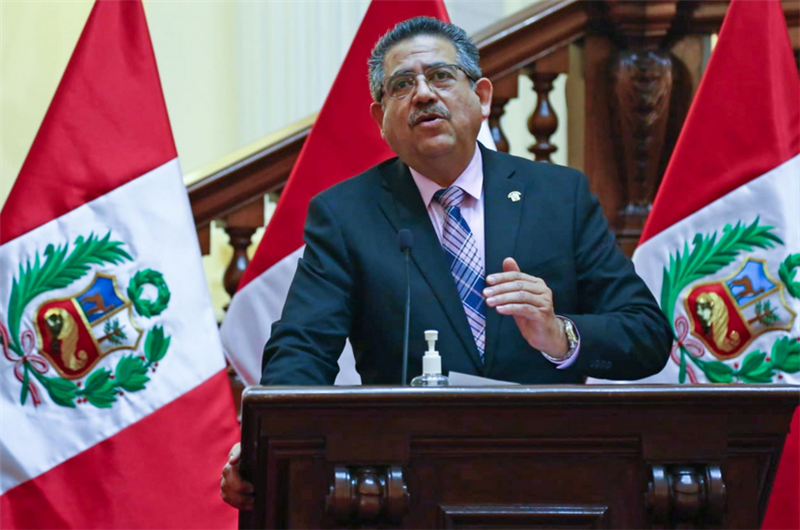
The president of Congress, Manuel Merino, is to be sworn in as President of Peru this morning at 10am, following the votes 105 lawmakers cast yesterday evening to impeach and oust President Martin Vizcarra.
The impeachment is being described by critics as a coup and a flagrant violation of the Constitution, and at the very least badly timed because of the Covid-19 pandemic and subsequent economic crisis, with general elections only five months away.
Early yesterday, President Vizcarra was in Congress to speak in his defense against the motion to impeach him. In a 45-minute address, in which he covered the successful actions of his government, Vizcarra questioned the motion because it was based on mere allegations of corruption made by people who are hoping to reach a deal as state witnesses and about acts that have yet to be substantiated. The investigation into the allegations —of bribes-for-contracts during his term as regional governor of Moquegua (2011-2014)— has only just begun and Vizcarra will be questioned by the district attorney’s office for the first time this week.
After Vizcarra’s address, Congress convened again at 1:30pm to begin the debate. By 6:30pm, they had 105 votes, more than the required 87 votes.
This was the second time Congress had moved to impeach Vizcarra. The first process was held in mid-September, on the grounds of “permanent moral incapacity” because of a series of contracts given via the Ministry of Culture to a mediocre entertainer, Richard Cisneros, known as Richard Swing. The scandal, which included different conversations recorded by the President’s personal secretary and encouraged by the shadowy figure of lawmaker Edgar Alarcon, provided dialogue worthy of a B-grade soap opera. The debate in Congress was equally poor, and there were insufficient votes to impeach the President.
A month later, on Oct. 20, lawmakers again moved to debate impeachment. The reason was the same — permanent moral incapacity— this time on the allegations of corruption prior to Vizcarra’s presidency. The debate was postponed for more than three weeks, however, while those proposing the motion could garner sufficient votes.
The irony of the process is that, as Vizcarra reminded Congress yesterday, 68 of the lawmakers who voted for the impeachment face a variety of criminal investigations and charges themselves, including murder. Members of Congress enjoy immunity from investigation and trial for the duration of their term in office.
Of these 68 lawmakers, all elected in January 2020, each faces anywhere between seven and up to 85 investigations and criminal processes. Daniel Urresti, possible presidential candidate for Podemos Perú, faces a 25-year sentence if found guilty later this month of the murder of a journalist in Ayacucho when he was army general in the 1980s. Edgar Alarcón, who has been the driving force behind both impeachment processes, faces a possible 17 years in prison for a series of corruption charges while he was Comptroller General. The Ethics commission has so far refused to review his case, despite a request from the office of the Attorney General. Now, with the shift in the Executive and consequently the Congress, the case is bound to be shelved again. Cecilia Garcia, a member of Podemos Perú as is Urresti, carries a double identity — when her driver’s license was cancelled, Garcia applied for a new identity card with a different name so that she could apply for a new driver’s license.
Considering that general elections are only five months away, critics of Vizcarra’s impeachment almost unanimously believe Congress has acted solely on personal and party interests that have been blocked so far by the Executive.
Although Merino said yesterday that elections would be held as scheduled, on April 11, 2021, critics believe lawmakers want to extend their mandate in Congress. This would also allow Merino, they believe, to pardon Antauro Humala, leader of Union por el Perú (Edgar Alarcon’s party), so that he can be a presidential candidate in the general elections. Antauro, brother of ex-President Ollanta Humala, is in prison for leading an uprising that caused the death of four police in Andahuaylas in 2005.
Other interests include the dismantling of Sunedu, the Education ministry’s supervisory body that has closed several below-standard universities, including at least two owned by political party founders.
The current Congress has also shown little if any interest in supporting the Executive’s battle against corruption, and there is a fear that the work to clean up the judiciary and the courts will be given little importance, allowing a corrupt network of judges (known as the White Collars of Callao) to regain its position, weakening even the four-years-long investigation into the Odebrecht bribery scandal known as Lava Jato.





